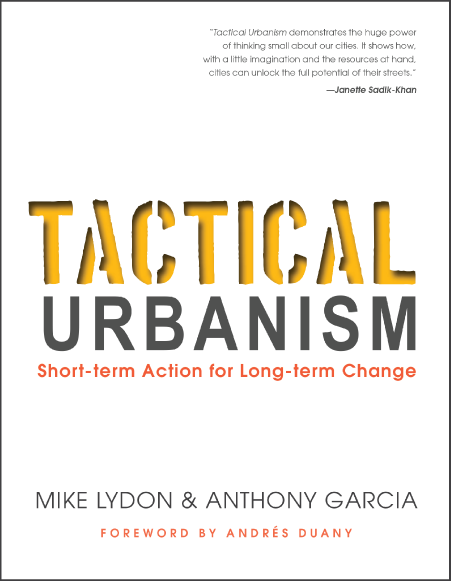The Case for Tactical Urbanism in the Age of Coronavirus
We are witnessing an unprecedented mobilization from countries around the world in response to the COVID-19 global pandemic. While there is no denying the severity of this crisis, one could argue that the looming reality of climate change, rampant inequality or threats to democracy pose an equal, if not larger, threat to civilization. Why, then, is our response to COVID-19 so radically different from the actions we have taken to address other crises?
Tangible. Concrete. Visible.
The key factors that lead to the prioritization of the COVID-19 crisis are the same factors that underpin the need for tactical urbanism in shaping local level policy decisions in response to a range of issues. Designing and implementing pilot projects that make abstract ideas tangible is a better policy process as compared to striving for a comprehensive policy through long internal deliberation. The simple adage “Show, Don’t Tell” is an apt description of the power of tactical urbanism as a policy tool used to gather concrete data indicators and creatively adapt to feedback.
Tactical urbanism, also known as urban prototyping, is defined as “short-term, low-cost, and scalable interventions to catalyze long-term change.” I was first introduced to the concept of prototyping in a graduate course at the University of Notre Dame focused on design thinking, a process which promotes the principles of empathy, creative ideation and ultimately capturing these ideas in a tangible manner. My perfectionist tendencies resisted and fought to keep my creative ideas locked inside the abstract parts of my brain until I analyzed their every dimension. This same tendency manifests itself in the resistance that many policymakers feel about innovative ideas that challenge the status quo. The abstract is comfortable, whereas the tangible entails uncertainty.
Listen to an interview Strong Towns president Chuck Marohn did with Mike Lydon & Anthony Garcia at CNU23.
The Commuters Trust Program is a positive outlier from South Bend, Indiana that powerfully reflects how tactical urbanism promotes tangible, concrete and visual progress in addressing complex policy challenges. A recent study identified that a lack of reliable transportation was a significant barrier to employment for one out of three workers in the region. Rather than agonize over designing and implementing a comprehensive policy program to overhaul the entire transportation system, Mayor Pete and his administration spearheaded a pilot program that “offers discounted Lyft rides and a free Transpo bus pass to selected employees...our goal is to help workers with transportation challenges get to work.” Over a four month period, the absentee rate decreased by 29% among the 155 program participants according to the program’s Phase I report.
A tangible program generates tangible feedback.
I partnered with the Commuters Trust Program to analyze and visualize the resulting data that we received from Lyft and Transpo which reflected user behavior from the program participants. Rather than abstractly discussing how best to address transportation as a barrier to employment, we were able to root our creative brainstorming in the tangible feedback we received. Ultimately the program leadership decided, based upon insights gathered from this data, to pivot and focus on supporting carpooling through Hytch Rewards as a more financially sustainable policy initiative.
Tactical urbanism as a policy tool is best implemented at the city level given its targeted scoping, though support can often come from the national level. For example, the Commuters Trust Program was funded through Bloomberg Philanthropies’ Mayor’s Challenge and other innovative mobility projects around the country are supported by the Federal Transit Administration’s Integrated Mobility Innovation Program. It is important to note here that tactical urbanism can take many shapes and forms and is by no means limited to the transportation sector.
Rooting abstract ideas in reality through tangible pilot programs promotes data-centered innovation which enables cities to rapidly and effectively meet the needs of its residents. The need for resilient and responsive policy making is especially pronounced as communities around the world struggle to respond to the new reality brought on by this global pandemic. As cities navigate these unprecedented policy challenges, they should strategically pursue tactical urbanism as an innovative tool to make abstract ideas tangible, gather concrete metrics and creatively respond to feedback.
About the Author
Joshua Pine is a Masters in Global Affairs candidate at the University of Notre Dame specializing in sustainable development. He has worked on projects for the past several years in South Bend IN with Mayor Pete’s administration and the Michiana Area Council of Governments focused on promoting inclusive and innovative transportation policies. You can connect with Joshua on LinkedIn.



